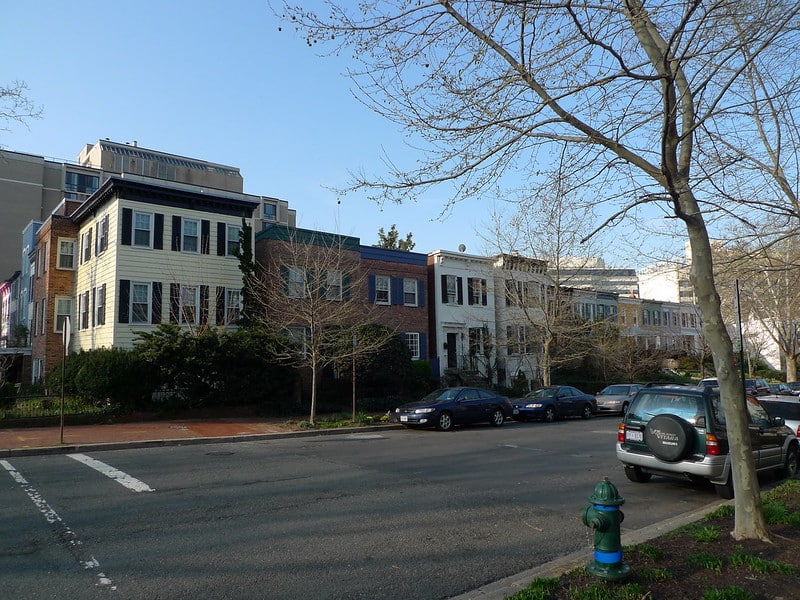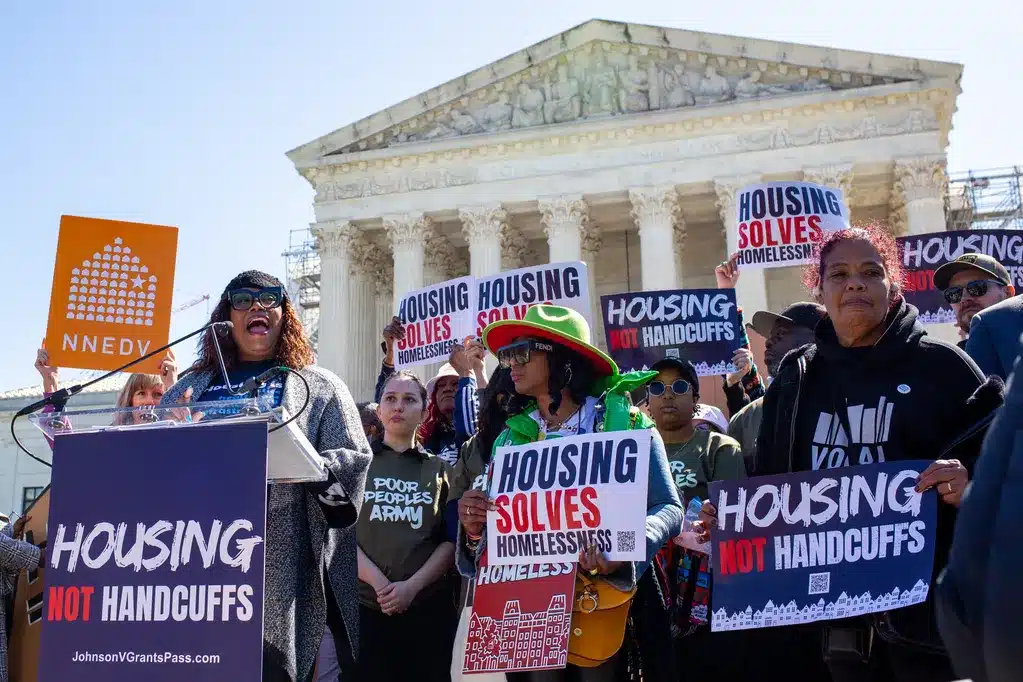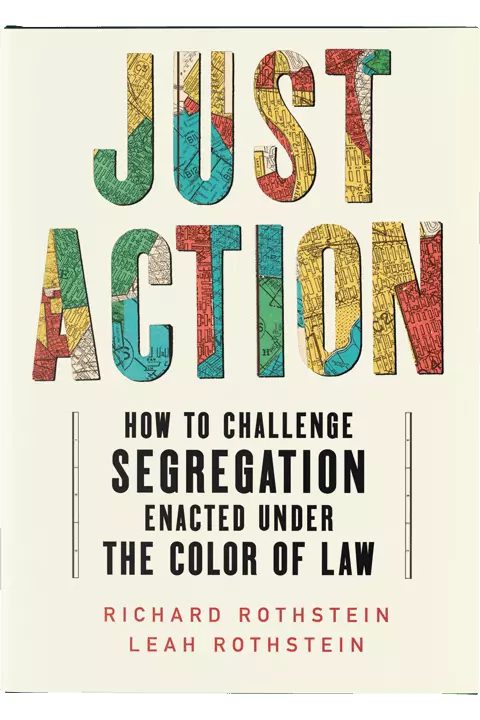|
Getting your Trinity Audio player ready...
|
Since it was enacted more than four decades ago, Washington, D.C.’s first-in-the-nation Tenant Opportunity to Purchase Act has granted tenants the right to the first bid on their apartment building if the owner decides to sell the property.
The landmark law, known as TOPA, aimed to preserve affordable housing and curtail resident displacement. But developers and building owners have long disapproved of the law, viewing TOPA as an encroachment on property rights and a hindrance to new development.
An email obtained by Next City and Shelterforce indicates private developers have proposed major exemptions to the law and are actively meeting with D.C.’s Department of Housing and Community Development as well as the Coalition for Nonprofit Housing and Economic Development (CNHED), a quasi-governmental member organization representing hundreds of nonprofit and for-profit developers.
While tenant purchases of buildings are rare in D.C., TOPA also allows tenants to negotiate with buyers who want to acquire their purchase rights, which tenants have used to win extensions on affordability as well as much-needed repairs.
The email shows that developers have advocated for two sweeping changes to the law that housing advocates say would effectively gut it: exemptions for affordable housing and exemptions for properties that are 25 years old or newer.
“It’s ironic to find that there’s certain cities discussing this as a best practice,” says Martha Davis, a member of CNHED. “And then we have a certain political movement in Washington, D.C. to curtail it significantly.”
Two Proposed Exemptions
The Feb. 7 email, which was sent by CNHED’s Chief Housing Officer Ryan Trout, indicates that the organization had met with the city’s housing department, D.C. Building Industry Association (DCBIA), which has a membership of 400 real estate development companies, and Housing Association of Nonprofit Developers (HAND) on Feb. 5 as part of a series of conversations about TOPA. A follow-up meeting was set for Feb. 20 to continue those talks. Trout indicated that his organization intended to host two conversations with TOPA working groups before that meeting took place.
“The Director has asked folks to return to the meeting with clear proposals,” the email stated. “Specific proposals mentioned by the private developers include exemptions for: properties with covenants already on buildings, and buildings 25 years old or younger.”
When Next City/Shelterforce asked the city’s housing agency if it was considering the private developers’ proposals, a spokesperson for DHCD Director Colleen Green said, “While it’s adamantly clear that TOPA encourages tenants to organize and preserve affordable housing in the District, it’s also within reason to look at how the process can be improved with sensible feedback from all interested stakeholders.
“We look forward to continuously engaging with housing advocates for their thoughtful input on preserving affordable housing in the District through TOPA,” the spokesperson said.
CNHED’s Trout declined to comment, saying, “we are engaged in restricted conversations.” Requests for comment sent to DCBIA and HAND were not returned.
At a Feb. 15 city council oversight hearing, Trout, speaking on behalf of CNHED, testified to the benefits of TOPA, saying the city’s housing agency “should recommit itself” to the law. Trout advocated for improvements at the hearing, including rapidly sharing TOPA notices with community-based organizations that the city contracts.
“CBOs can ensure that tenants are informed of their rights before bad actors get involved, delays in posting TOPA notices and the lack of clarity in the process disadvantage tenants . . . seeking to exercise their rights,” Trout said at the hearing.
New exemptions to TOPA require approval by the city council and would need to pass its housing committee. In an email to Next City/Shelterforce, the chair of the city council housing committee Robert White said the proposals in question have not come before the council.
“Any changes must further the District’s affordability goals, reduce displacement, support larger-sized units for families, and provide space for tenants to negotiate improved building conditions,” White said. He cited a 10-year TOPA exemption for the downtown area that was passed last year and said, “We have not received another related or expanded proposal. If we do, I will analyze the proposal in the full context to make sure it does not undermine the purpose of TOPA.”
But TOPA experts say they’ve fielded questions on the feasibility of the proposals from the city council. Farah Fosse, an independent housing policy consultant who has gathered data for CNHED’s TOPA research reports, found the proposals baffling.
“It’s just blowing my mind that we’re talking about exempting affordable buildings,” Fosse told Next City/Shelterforce.
“This is kind of like if we were working on traffic safety and you called me and were like, ‘The city’s trying to improve traffic safety. What do you think about the proposal to get rid of traffic crosswalks?’”
Robert Wohl, an activist who organizes with the group Stomp Out Slumlords, part of D.C.’s Democratic Socialists of America branch, says it’s been difficult to get anyone on the city council to clarify where they stand on the exemptions.
Politicians don’t want to admit that they’re preparing to touch TOPA. They also won’t disclaim it, because they’re being lobbied really hard . . .
Robert Wohl, an organizer with Stomp Out Slumlords
“Politicians don’t want to admit that they’re preparing to touch TOPA. They also won’t disclaim it, because they’re being lobbied really hard,” says Wohl, who protested the unofficial proposals at a rally last month. “And behind the scenes, I’m quite confident that somebody is trying to work something out.”
There is one area where housing experts believe TOPA could be reformed, but CNHED has seemed reluctant to push for it.
Experts want a “cooling off” period when a building goes up for sale that would allow tenants to be educated on their TOPA rights before they can be potentially misled by landlords. That was among the recommendations in a November report by CNHED (see page 67), which found that building owners were sometimes getting tenants to sign away their TOPA rights prematurely and suggested a 45-day period after a notice of sale where tenants could not reassign their rights.
The Feb. 7 email sent by CNHED’s Trout to TOPA stakeholders referred to a proposal for a “cooling off period” as “a possibility, nonstarter.” Trout instead asked “are there other ways to get to that goal–e.g. certified folks to engage in process, educate.”
Curbing a Tool for Tenant Rights
The evidence suggests that TOPA has been a powerful tool for tenants who wish to stay in their homes.
The November report commissioned by D.C.’s city council, produced by CNHED and conducted by independent researchers, looked at TOPA data from 2006 to 2020. It found that in that period, there were 19,170 units where tenants either negotiated for better conditions, including repairs and extensions on affordability, or formed a tenant union and purchased the building.
Meanwhile, Davis says, the potential exemptions are not supported by evidence. “We don’t know of any factual or analytical basis for [the proposals],” says Davis, a consultant who worked on the TOPA report. “They’re kind of out of the blue.”
Davis says an exemption for affordable buildings could interfere with programs like the Housing Preservation Loan Fund, which provides public and private funds to borrowers who intend to buy federally assisted affordable housing and keep it affordable. Affordable housing built through federal tax credits generally stays affordable for only 30 years unless an extension is negotiated, typically through new financing. And a large percentage of new housing projects do use federal credits.
“Something like that could fit into that exemption category. And that would be really wrongheaded . . . that’s not a justification for treating that building differently,” Davis says.
Similarly, the proposed exemption for buildings 25 years or younger appears to be premised on the idea that TOPA is restricting the construction of new housing. Both Davis and Fosse say there is no data to support this notion—and that an examination of D.C. housing construction since the law took effect in 1980 demonstrates that TOPA does not restrict construction.
“We have 44 years that indicate TOPA didn’t hold back the development of market-rate housing in the city or any kind of new housing, renovation or development,” Davis says.
While housing production slowed after the 1980 TOPA law, it happened in the context of the city’s overall population decline, which reached a 60-year low in the late 1990s. The overall annual trend in D.C. has been an increase in housing production since the end of the Great Recession.
In 2018, D.C. exempted single-family homes from TOPA. At around this time, tenants started purchasing far fewer apartments through the law. Data compiled for the CNHED report shows there was an average of 1,469 units purchased through TOPA between 2014 to 2018 but only 415 in 2019 and 342 in 2020.
And in 2023, lawmakers pushed through a 10-year TOPA exemption for planned commercial-to-residential conversions in the downtown area. D.C.’s downtown, like that of many cities in the U.S., is facing a historic decline in commercial real estate leases as a result of the rise in remote work. In February, Mayor Muriel Bowser unveiled a revitalization plan for the downtown area intended to attract new businesses.
Last year’s downtown TOPA exemption was also criticized by advocates and, Fosse believes, was pushed through despite a lack of data affirming that TOPA was hindering development.
“We’ve seen huge real estate booms, huge increases in prices, huge loss of affordable housing, all while D.C. was actually very much using the TOPA process, and in a much more robust way than it is now,” Fosse says. “So faulting TOPA for problems with the downtown property sales, it doesn’t make sense.”
Wohl believes that the two proposed exemptions are being pushed through because of fears over the city’s finances. D.C. is facing a $700 million budget shortfall this year and a $4 billion deficit through 2029, according to The Washington Post. A February letter from D.C.’s chief financial officer laid out some reasons for this, including a 0.2 percent decrease in income tax receipts.
“The city government is just freaking out about their financial situation,” Wohl says. “I think the developers just think that they have an opportunity to . . . say investment is fleeing the city. So they’re going to use that to just take whatever they can get.”
More than two years ago, the city council asked for the CNHED report on TOPA due to a lack of data on the law’s impact. But there’s concern that lawmakers are not referring to the research they now have.
Davis says it was frustrating to work on the CNHED report only for the data to be seemingly ignored. She cited the example of Nina Albert, deputy mayor for planning and economic development, telling reporters that TOPA adds 18 months to the timeline of a sale. But the report commissioned by the city found that the law adds just five months to the timeline of a sale. “What’s frustrating is whether . . . the facts have any role to play in the political discussion,” Davis sa. “We have some facts out, we think they’re well-documented. And then the suggestion for exemptions is based on no facts that we know of. That’s an odd situation
This story was published through a collaboration with Shelterforce and Next City. Next City is a nonprofit news outlet that publishes solutions to the problems that oppress people in cities, inspiring social, economic, and environmental change through journalism and events around the world.





Your writing has a way of making me feel like I’m having a conversation with a trusted friend.
When actually implemented, the TOPA ordinance is a critical component for preserving affordable housing in DC as prominently noted in both of the Analyses of Impediments to Fair Housing Choice (AI) that we conducted in 2012 and 2019. Implementing TOPA and the city’s inclusionary zoning provisions are the only two genuine effective tools for preserving and creating affordable housing the in the District of Columbia (or anywhere else) and for preventing even more intense racial and economic segregation in our nation’s captiol which is already a poster child for American Apartheid. You can download the 2012 AI from http://www.planningcommunicationsDOTcom — substitute a period for DOT and click on the “Analysies of Impediments and AFH” button.